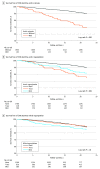Association of Mild Valvular Lesions With Long-term Cardiovascular Outcomes Among Black Adults
- PMID: 35552723
- PMCID: PMC9099428
- DOI: 10.1001/jamanetworkopen.2022.11946
Association of Mild Valvular Lesions With Long-term Cardiovascular Outcomes Among Black Adults
Abstract
Importance: Little is known about the long-term outcomes of mild valvular lesions.
Objective: To examine the associations of 3 major types of valvular lesions (aortic stenosis, trace or mild aortic regurgitation, and trace or mild mitral regurgitation) with risk of cardiovascular mortality, coronary heart disease (CHD), stroke, heart failure, and atrial fibrillation.
Design, setting, and participants: This cohort study analyzed data from the ongoing Atherosclerosis Risk in Communities study and focused on Black participants in the Jackson, Mississippi, site who underwent echocardiography at visit 3 from 1993 to 1995. Data analysis was conducted between April 2021 and February 2022.
Exposures: Three valvular lesions were analyzed: aortic sclerosis, aortic regurgitation (trace or mild), and mitral regurgitation (trace or mild).
Main outcomes and measures: The outcomes were cardiovascular mortality, coronary heart disease, heart failure, stroke, and atrial fibrillation. Multivariable Cox proportional hazards regression models were used to examine the independent associations between the 3 valvular lesions and these outcomes.
Results: A total of 2106 Black participants were included, with a mean (SD) age of 59.1 (5.6) years and 1354 women (64.3%). The baseline prevalence was 7.7% for aortic sclerosis, 15.1% for aortic regurgitation (6.1% with trace, and 9.0% with mild), and 43.0% for mitral regurgitation (29.4% with trace, and 13.6% with mild). During a median (interquartile interval) follow-up of 22.5 (15.6-23.5) years, 890 participants developed at least 1 cardiovascular outcome. Each valvular lesion was significantly associated with at least 1 cardiovascular outcome: aortic sclerosis was associated with cardiovascular mortality (adjusted hazard ratio [HR], 1.54; 95% CI, 1.06-2.22), mild mitral regurgitation was associated with atrial fibrillation (HR, 1.47; 95% CI, 1.09-1.99), and trace or mild aortic regurgitation was associated with all outcomes (HRs ranging from 1.45 [95% CI, 1.17-1.81] to 1.75 [95% CI, 1.29-2.37]) except stroke. The total number of valvular lesions had graded associations with all cardiovascular outcomes except stroke: the HR of cardiovascular mortality was 1.77 (95% CI, 1.18-2.65) for those with 2 to 3 lesions and was 1.44 (95% CI, 1.05-1.96) for those with 1 lesion vs no lesions.
Conclusions and relevance: Results of this study indicate an association between valvular lesions, even at mild stage, and a long-term risk of cardiovascular events, suggesting the importance of recognizing and monitoring these valvular conditions.
Conflict of interest statement
Figures


Comment in
-
The Spectrum of Valvular Heart Disease and the Importance of "Mild".JAMA Netw Open. 2022 May 2;5(5):e2211955. doi: 10.1001/jamanetworkopen.2022.11955. JAMA Netw Open. 2022. PMID: 35552729 No abstract available.
Similar articles
-
Prognostic implications of valvular heart disease in patients with non-valvular atrial fibrillation.BMC Cardiovasc Disord. 2021 Sep 18;21(1):453. doi: 10.1186/s12872-021-02264-3. BMC Cardiovasc Disord. 2021. PMID: 34536990 Free PMC article.
-
Natural history and predictors of outcome in patients with concomitant functional mitral regurgitation at the time of aortic valve replacement.Circulation. 2006 Jul 4;114(1 Suppl):I541-6. doi: 10.1161/CIRCULATIONAHA.105.000976. Circulation. 2006. PMID: 16820634
-
Stages of Valvular Heart Disease Among Older Adults in the Community: The Atherosclerosis Risk in Communities Study.Circulation. 2023 Feb 21;147(8):638-649. doi: 10.1161/CIRCULATIONAHA.122.061396. Epub 2022 Dec 16. Circulation. 2023. PMID: 36524478 Free PMC article.
-
[The best of valvular heart disease in 2006].Arch Mal Coeur Vaiss. 2007 Jan;100 Spec No 1:19-28. Arch Mal Coeur Vaiss. 2007. PMID: 17405561 Review. French.
-
Valvular Heart Disease and Heart Failure in Women.Heart Fail Clin. 2019 Jan;15(1):77-85. doi: 10.1016/j.hfc.2018.08.008. Heart Fail Clin. 2019. PMID: 30449382 Review.
Cited by
-
The burden of cardiovascular disease and risk for subsequent major adverse cardiovascular events in survivors of childhood cancer: a prospective, longitudinal analysis from the St Jude Lifetime Cohort Study.Lancet Oncol. 2024 Jun;25(6):811-822. doi: 10.1016/S1470-2045(24)00157-8. Lancet Oncol. 2024. PMID: 38821086 Free PMC article.
-
A New Benchmark for Modern Management of Valvular Heart Disease: The Whole-Life Cycle Management System.JACC Asia. 2025 May;5(5):609-632. doi: 10.1016/j.jacasi.2025.01.017. Epub 2025 Apr 8. JACC Asia. 2025. PMID: 40202473 Free PMC article. Review.
-
New Threshold for Defining Mild Aortic Stenosis Derived From Velocity-Encoded MRI in 60,000 Individuals.J Am Coll Cardiol. 2025 Apr 8;85(13):1387-1399. doi: 10.1016/j.jacc.2025.01.035. J Am Coll Cardiol. 2025. PMID: 40175013
References
-
- Yancy CW, Jessup M, Bozkurt B, et al. . 2017 ACC/AHA/HFSA Focused Update of the 2013 ACCF/AHA Guideline for the Management of Heart Failure: a report of the American College of Cardiology/American Heart Association Task Force on Clinical Practice Guidelines and the Heart Failure Society of America. J Am Coll Cardiol. 2017;70(6):776-803. doi:10.1016/j.jacc.2017.04.025 - DOI - PubMed
-
- Thomas KL, Jackson LR II, Shrader P, et al. . Prevalence, characteristics, and outcomes of valvular heart disease in patients with atrial fibrillation: insights from the ORBIT-AF (Outcomes Registry for Better Informed Treatment for Atrial Fibrillation). J Am Heart Assoc. 2017;6(12):6. doi:10.1161/JAHA.117.006475 - DOI - PMC - PubMed
-
- Otto CM, Nishimura RA, Bonow RO, et al. ; Writing Committee Members . 2020 ACC/AHA Guideline for the Management of Patients With Valvular Heart Disease: executive summary: a report of the American College of Cardiology/American Heart Association Joint Committee on Clinical Practice Guidelines. J Am Coll Cardiol. 2021;77(4):450-500. doi:10.1016/j.jacc.2020.11.035 - DOI - PubMed
Publication types
MeSH terms
Grants and funding
LinkOut - more resources
Full Text Sources
Medical
Miscellaneous

